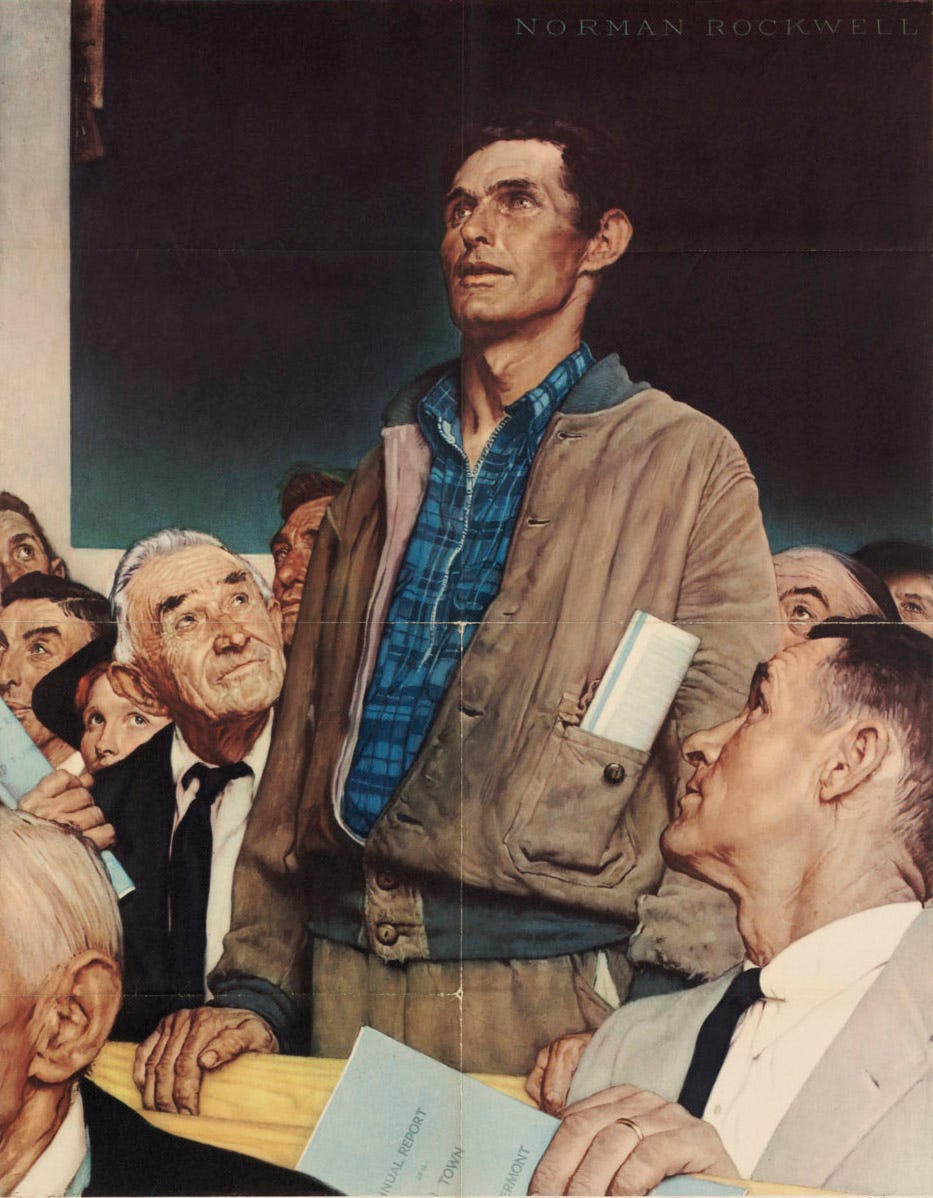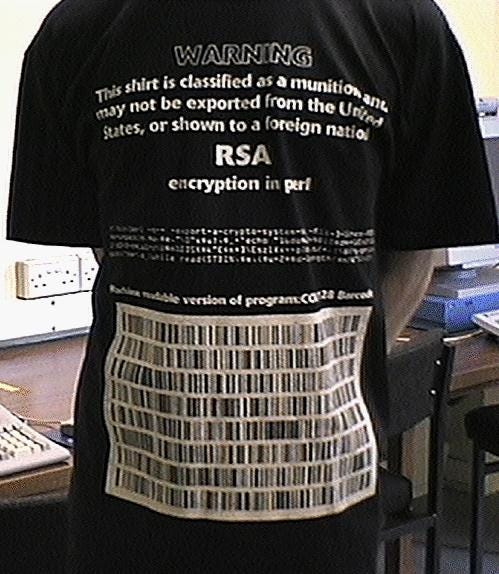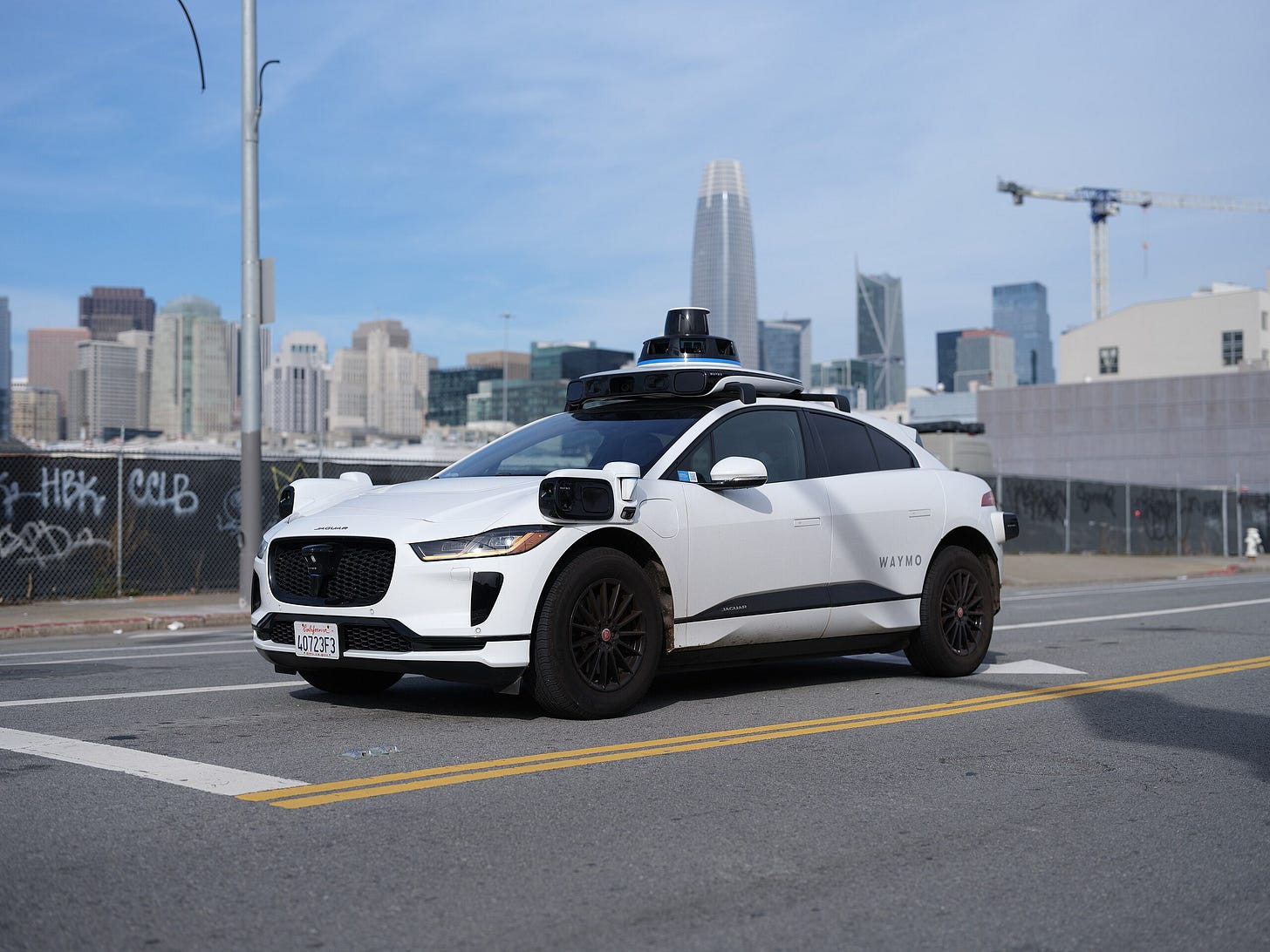Open Weights, Open Society, Open Future
We must protect open source and open weights AI at every level of society, and we've got to reject dangerous + delusional anti-AI agitators attempts to crush it or we risk smashing our future economy
(Source: “Save Freedom of Speech, by Norman Rockwell)
We must protect open source and open weights AI at every level of society.
Attempts to control or suppress the weights of models must be wholeheartedly rejected as a policy or we risk crushing our future economy.
We already have a strong historical evidence that misguided restrictions on open sharing of ideas and software crush economic value and innovation. If we look to the history of restrictions on encryption in browsers in the 1990s we clearly see that those restrictions did nothing to stop the spread of encryption and instead drastically slowed down progress in online commerce for a time. The US policy in the 1990s was to allow 40 bit encryption for export but require a separate license for 128 bit encryption. This crippled the ability to do e-commerce effectively, because the weaker encryption was hackable by criminals, not just government intelligence agencies. Even worse, the process of getting a license to use 128 bit encryption was slow, onerous and so painful that most Americans didn't even bother doing it, opting for the weaker encryption that left their transactions and personal information vulnerable to attacks and theft.
Removing the restrictions on 128 bit encryption lead to a worldwide, global boom in e-commerce "worth over US$3,226.00bn in 2024, and expected to grow to US$5,145.00bn by 2029." Strong encryption was directly responsible for that economic boom.
(Source: Wikipedia: “Export-restricted RSA encryption source code printed on a T-shirt made the T-shirt an export-restricted munition, as a freedom of speech protest against US encryption export restrictions.”)
None of that boom would have been possible if we had continued with onerous and innovation sapping restrictions on encryption.
Attempts to control the weights of models will have a similar crushing effect on innovation and the US economy. Any and all approaches to controlling weights will only hold back US competitiveness, give a leg up to hostile nation states and give China a massive advantage now and in the future.
To understand why, you just need to look at the role open source plays in the world today. Open source powers between 92% and 97% of the world's software in one form or another. According to an Octoverse study, "In 2022 alone, developers started 52 million new open source projects on GitHub—and developers across GitHub made more than 413 million contributions to open source projects."
Open source levels the playing field in life. It gives everyone the same building blocks. You get to use the same software as mega-corporations with 10s of billions of dollars in revenue. You get to use the same software as super powerful governments around the world. So do charities, small businesses just getting started, universities, grade schools, hobbyists, tinkerers and more.
Linux runs every major cloud, almost every supercomputer on the planet, all the AI model training labs (including the proprietary model makers who are telling you open source must be restricted), [your smart phone](https://source.android.com/docs/core/architecture/kernel), the router in your house that you connect to the internet with every day and so much more. That's what open software does. It proliferates in a virtuous cycle of safety and stability and usefulness.
None of this would have been possible with restrictions and barriers on open source software, or if onerous requirements restricting open source stood in the way.
Some companies tried to stop open source early in its development. Microsoft and Sco wanted to destroy Linux in the 1990s and early 2000s. Balmer and Gates called Linux "communism" and "cancer". They told us it would destroy capitalism and intellectual property and put big companies out of business.
They were absolutely and totally wrong on every front.
Today, even Microsoft loves Linux and it powers the majority of their Azure cloud business. Instead of destroying their value, it's now the software that underpins their core business and everyone else's too. If they'd been successful in crushing open source, they would have smashed their own future revenue through short-sightedness and lack of vision.
If we let AI evolve properly and realize its true, bottom up evolutionary potential it will have a similar effect on the economy tomorrow, the equivalent of many trillions of dollars in economic value to the US and the world.
Open source is the backbone of the world's economy now, and open source and open weights AI will be the backbone of the world economy tomorrow.
That's because Artificial Intelligence holds tremendous potential to transform medicine, discover new antibiotics, make cars much safer, make legal knowledge and coding skills more accessible, and translate text into lesser used languages spreading knowledge farther and wider. It's already doing this and more.
But if anti-AI and anti-open source pressure groups are successful in strangling AI in its crib, we'll end up with three or four companies who have a license to make powerful models and every one else will be locked out. This is the death of innovation and it will be a disaster for the US economy. We'll get stuck with a bland, watered down, neutered AI in the western world, while authoritarian states rocket forward with surveillance, control and weapons first AI, blissfully ignoring the policies we created and laughing as we force feed ourselves economic poison pills.
It's important to understand that these attempts to restrict open source AI are not coming from a genuine place. They are coming from people who, like many cults before them, believe in the end of the world. Non-profit groups, like the Machine Intelligence Research Institute] (MIRI), which does zero actual AI research, push fear and make money by pressing the idea that AI will kill us all or take over the world. They are staffed by people who believe in the idea that AI has a 90% chance of killing every human on Earth. This is fundamentally insane and cannot be used to create sound, sane, effect policy for any serious government legislator or regulatory organization. The only difference with cults of the past is that they do not believe God, a plague, or aliens will come down and destroy the world, but AI.
They are not trying to restrict open source because they believe it has any practical dangers. They are trying to cripple AI in its crib because they believe AI must be destroyed completely. Their goal is to kill American innovation altogether because they believe AI must be stopped at all costs.
One of MIRI's leaders, Eliezer Yudkowsky, a high school dropout, wrote an opinion piece in Time magazine where he wrote with a straight face that we need to halt all AI development:
"The moratorium on new large training runs needs to be indefinite and worldwide. There can be no exceptions, including for governments or militaries...Shut down all the large GPU clusters (the large computer farms where the most powerful AIs are refined). Shut down all the large training runs...If intelligence says that a country outside the agreement is building a GPU cluster, be less scared of a shooting conflict between nations than of the moratorium being violated; be willing to destroy a rogue datacenter by airstrike."
This is not the writing of a sane and well reasoned mind. It is a paranoid sci-fi fantasy that must be treated as completely useless when making actual policy in the real world.
These ideas should be dismissed as quickly as we dismiss other cult ideas. They are dangerous and misguided and they should be swiftly thrown out by any serious policy maker.
Other people who want to destroy open source AI are folks like the founder of Inflection AI, an owner of 22,000 H100s GPUs to train advanced AIs. He proposes to make high end open source AI work illegal.
We cannot possibly take anyone seriously who has 22,000 GPUs to train AI when they say AI is dangerous. This is regulatory capture pure and simple and it must be recognized for what it is and rejected outright.
More than anything, the problem with all of these anti-open ideas is that they come from a fundamental misunderstanding of how open societies work, how economies work, and how open source software has changed the world for the better over the last few decades.
No technology is without risk. Linux powers the entire cloud, nearly every super computer on earth and smart phones but it is also used to write malware and create botnets to attack websites. We do not restrict Linux access because of a few bad actors. We punish the bad actors because the benefits of open access always vastly outweigh the risks.
AI is a "risk" worth taking. It will revolutionize health care, fun, entertainment, productivity and more. It will help us create new life saving drugs, and make driving safer, and stop more fraud and revolutionize learning while you chat with your AI to learn a new language or a new subject.
To get there we need open innovation and sharing, just as we saw with open source software of the past. Open source allows more minds to work on a problem. No matter how rich a company is they cannot possibly hire enough engineers to compete with the Linux kernel's 1 million plus contributions. That is the power of open source and it must be protection as we move into the AI era.
Free societies are built on risk. Free societies emphasize people's ability to make their own choices and to take on risk for themselves. Sometimes people make bad choices and they get punished. It's still worth having an open and free society.
If we build a highway, someone can drive too fast and kill themselves or others. We still build highways. Build a boat and people can drown. Many people have gone down to the watery depths over countless millennia and we still build boats. People die in construction accidents and we still build skyscrapers. Linux runs every major cloud, your home router and supercomputers but it is also used to write botnets and hacking tools. We don't ban Linux.
You have a 1 in 93 chance of dying in a car accident in your lifetime. You still get in a car. While anti-AI agitators point out everything that can go wrong with AI they usually fail to point out what good it can do in the world. Driving is one of those risks that AI can cut dramatically. We kill 1.35 million people on the road every year and injure 50 million more. If AI cuts that down to a quarter that is 1 million people walking around and playing with their children and living their lives.
(Source: Dllu, Wikimedia Commons)
Along the way, as technology develops, we try to mitigate risk but we do it intelligently, balancing for the ability to move forward freely. As a society we're always trying to strike the right balance between freedom and security. We have to let people freely innovate without permission and compliance nightmares or top town authoritarian control if we want to reap the benefits of technology.
We should have the freedom to share models and research openly, to interact with AI the way we want and to not have AI locked up and controlled by a few people who want to keep all the benefits for themselves and dole out its benefits sparingly to the rest of us.
More intelligence, more widely spread, is the best way to make this world safer and more abundant for as many people as possible.
When you think about it, what doesn't benefit from more intelligence?
More kids in school means we have smarter kids. More intelligence in our software means it reacts better to what we want and need faster.
If we let open source AI properly proliferate and we don't kill it in the crib based on regulatory capture disguised as safety, intelligence will weave its way into every single aspect of our lives, making our economy strong and faster, our lives longer and our systems more resilient and adaptable.
You're probably reading this on something that's built on open source, whether that's your phone or your laptop. It doesn't matter if your phone is an Android phone or an iPhone, there is some open source in there. The kernel of both MacOS and iOS are open source and Android has a Linux kernel in it. Yes they are wrapped in proprietary code but that's the beauty of open source. If you're a big, rich tech company, you can build flashy proprietary things on top of it.
Open is everything. Open software is the most important software now and it will be the most important software in the future if we're smart and make sound, sane policies, instead of foolishly restrictive policies.
Trust in the democratic way. Trust in open.





